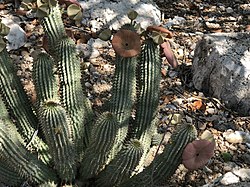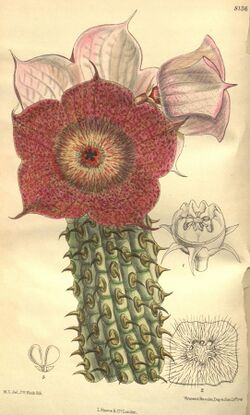Biology:Hoodia currorii
| Hoodia currorii | |
|---|---|

| |

| |
| Scientific classification Error creating thumbnail: Unable to save thumbnail to destination
| |
| Kingdom: | Plantae |
| Clade: | Tracheophytes |
| Clade: | Angiosperms |
| Clade: | Eudicots |
| Clade: | Asterids |
| Order: | Gentianales |
| Family: | Apocynaceae |
| Genus: | Hoodia |
| Species: | H. currorii
|
| Binomial name | |
| Hoodia currorii (Hook.) Decne.
| |
Hoodia currorii is a succulent plant native to Namibia and the Cape Province of South Africa .[1] It grows in desert areas and is common along the road from Karibib to Swakopmund in Namibia.[2] It is also known as ghaap in the vernacular.[3]
Description
Hoodia currorii grows in erect clumps with gray-green stems, 8 centimeters in diameter.[4] It reaches heights of 50 to 80 centimeters tall.[4] It bears rust-red flowers mid-summer[5] which are covered in purple hairs.[4] These are large flowers, about five to ten centimeters in diameter.[2]
Cultivation
Hoodia currorii is more commonly seen cultivated than other Hoodia species.[5] It can be grown from cuttings.[5]
Uses
Hoodia currorii may be eaten after the spines are removed and is said to have a sweet flavor.[3]
References
- ↑ {{citation | mode = cs1 | title = Hoodia currorii | work = Germplasm Resources Information Network (GRIN) | url = | publisher = [[Organization:Agricultural Research ServAgricultural Research Service (ARS), United States Department of Agriculture (USDA) | access-date = 18 July 2015 }}
- ↑ 2.0 2.1 "Hoodia in Namibia". http://www.nbri.org.na/sites/default/files/Hoodia_booklet.pdf.
- ↑ 3.0 3.1 Grubben, G.J.H., ed (2004). Plant Resources of Africa 2: Vegetables. Wageningen, Netherlands: Backhuys Publishers. pp. 329–331. ISBN 9057821478. https://archive.org/details/bub_gb_6jrlyOPfr24C. Retrieved 18 July 2015. "Hoodia currorii."
- ↑ 4.0 4.1 4.2 Sajeva, Maurizio; Costanzo, Mariangela (2000). Succulents II: The New Illustrated Dictionary. Portland, Oregon: Timber Press. pp. 159. ISBN 9780881924497.
- ↑ 5.0 5.1 5.2 Anderson, Miles (2008). The Complete Illustrated Guide to Growing Cacti & Succulents. London: Lorenz Books. pp. 175. ISBN 9780754818427.
Wikidata ☰ Q15356740 entry
 |

